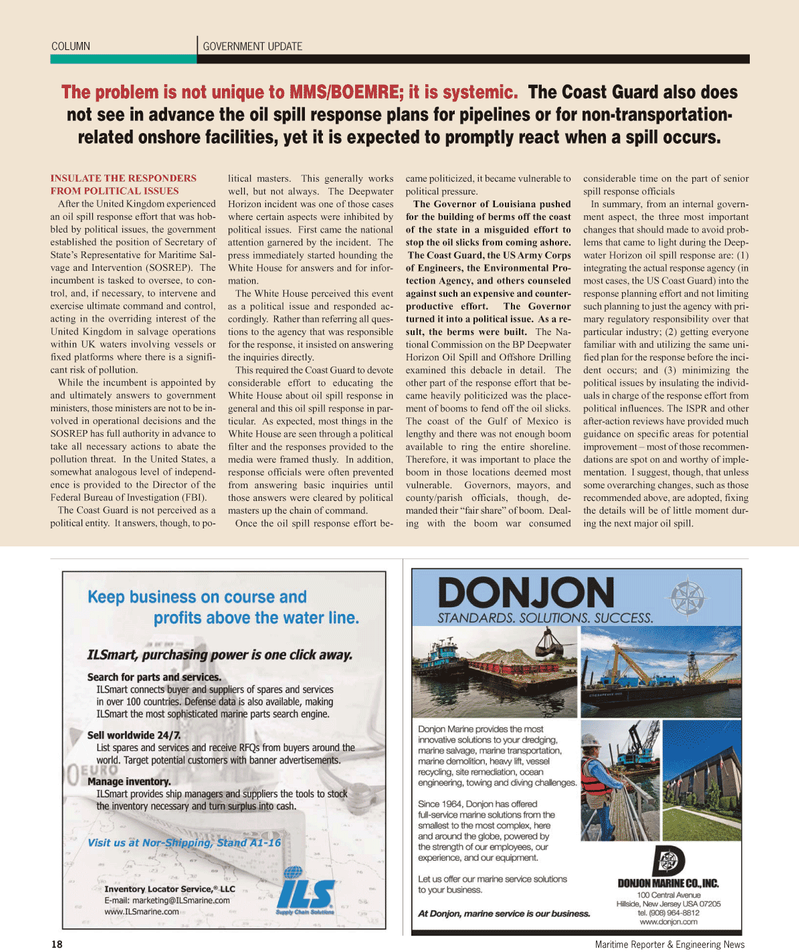
Page 18: of Maritime Reporter Magazine (May 2011)
Training & Education Edition
Read this page in Pdf, Flash or Html5 edition of May 2011 Maritime Reporter Magazine
INSULATE THE RESPONDERS
FROM POLITICAL ISSUES
After the United Kingdom experienced an oil spill response effort that was hob- bled by political issues, the government established the position of Secretary of
State’s Representative for Maritime Sal- vage and Intervention (SOSREP). The incumbent is tasked to oversee, to con- trol, and, if necessary, to intervene and exercise ultimate command and control, acting in the overriding interest of the
United Kingdom in salvage operations within UK waters involving vessels or fixed platforms where there is a signifi- cant risk of pollution.
While the incumbent is appointed by and ultimately answers to government ministers, those ministers are not to be in- volved in operational decisions and the
SOSREP has full authority in advance to take all necessary actions to abate the pollution threat. In the United States, a somewhat analogous level of independ- ence is provided to the Director of the
Federal Bureau of Investigation (FBI).
The Coast Guard is not perceived as a political entity. It answers, though, to po- litical masters. This generally works well, but not always. The Deepwater
Horizon incident was one of those cases where certain aspects were inhibited by political issues. First came the national attention garnered by the incident. The press immediately started hounding the
White House for answers and for infor- mation.
The White House perceived this event as a political issue and responded ac- cordingly. Rather than referring all ques- tions to the agency that was responsible for the response, it insisted on answering the inquiries directly.
This required the Coast Guard to devote considerable effort to educating the
White House about oil spill response in general and this oil spill response in par- ticular. As expected, most things in the
White House are seen through a political filter and the responses provided to the media were framed thusly. In addition, response officials were often prevented from answering basic inquiries until those answers were cleared by political masters up the chain of command.
Once the oil spill response effort be- came politicized, it became vulnerable to political pressure.
The Governor of Louisiana pushed for the building of berms off the coast of the state in a misguided effort to stop the oil slicks from coming ashore.
The Coast Guard, the US Army Corps of Engineers, the Environmental Pro- tection Agency, and others counseled against such an expensive and counter- productive effort. The Governor turned it into a political issue. As a re- sult, the berms were built. The Na- tional Commission on the BP Deepwater
Horizon Oil Spill and Offshore Drilling examined this debacle in detail. The other part of the response effort that be- came heavily politicized was the place- ment of booms to fend off the oil slicks.
The coast of the Gulf of Mexico is lengthy and there was not enough boom available to ring the entire shoreline.
Therefore, it was important to place the boom in those locations deemed most vulnerable. Governors, mayors, and county/parish officials, though, de- manded their “fair share” of boom. Deal- ing with the boom war consumed considerable time on the part of senior spill response officials
In summary, from an internal govern- ment aspect, the three most important changes that should made to avoid prob- lems that came to light during the Deep- water Horizon oil spill response are: (1) integrating the actual response agency (in most cases, the US Coast Guard) into the response planning effort and not limiting such planning to just the agency with pri- mary regulatory responsibility over that particular industry; (2) getting everyone familiar with and utilizing the same uni- fied plan for the response before the inci- dent occurs; and (3) minimizing the political issues by insulating the individ- uals in charge of the response effort from political influences. The ISPR and other after-action reviews have provided much guidance on specific areas for potential improvement – most of those recommen- dations are spot on and worthy of imple- mentation. I suggest, though, that unless some overarching changes, such as those recommended above, are adopted, fixing the details will be of little moment dur- ing the next major oil spill.
COLUMN GOVERNMENT UPDATE 18 Maritime Reporter & Engineering News
The problem is not unique to MMS/BOEMRE; it is systemic. The Coast Guard also does not see in advance the oil spill response plans for pipelines or for non-transportation- related onshore facilities, yet it is expected to promptly react when a spill occurs.

 17
17

 19
19
